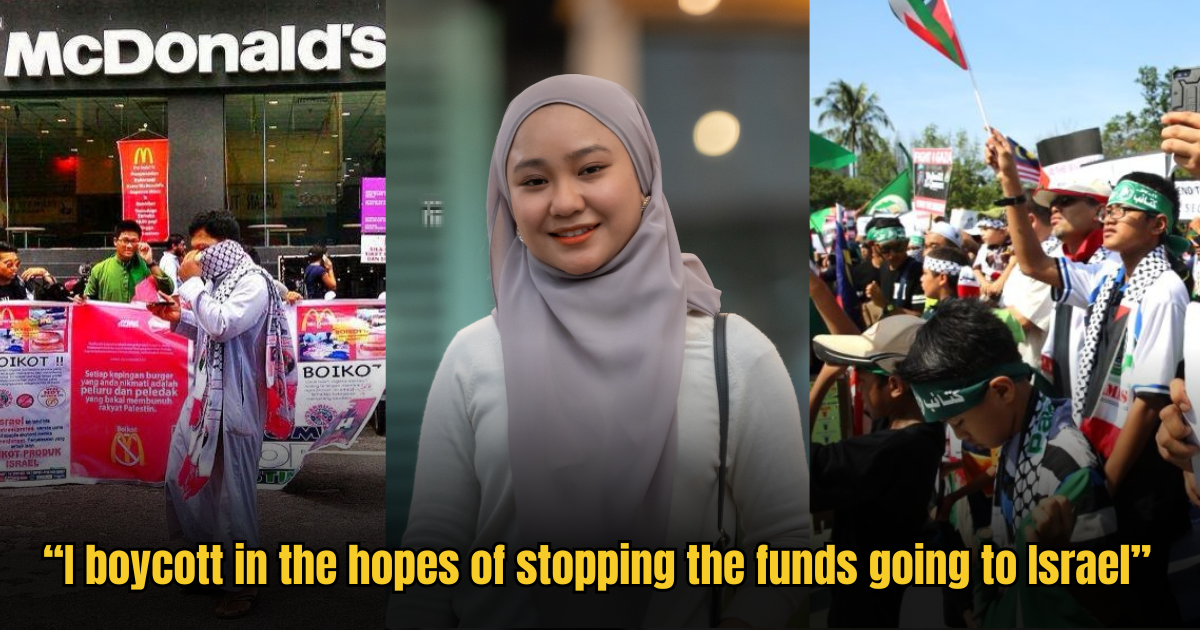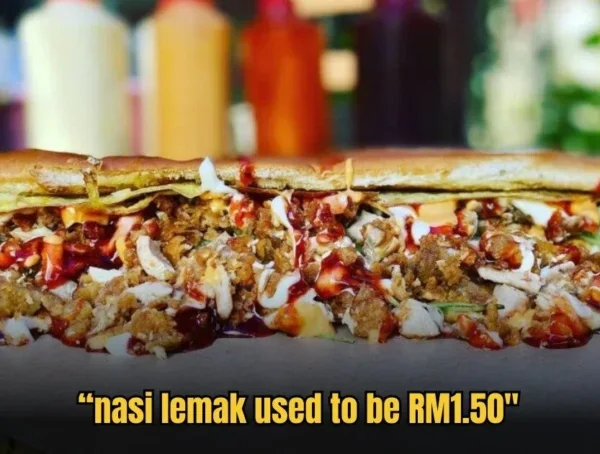Disclaimer: In Real Life is a platform for everyday people to share their experiences and voices. All articles are personal stories and do not necessarily echo In Real Life’s sentiments. Follow us on Facebook, Instagram, Telegram and Tiktok. Written by guest contributor Arshad.

For the past year, Malaysians have been boycotting brands listed by BDS Malaysia, an NGO which alleged that these brands were complicit in the Palestine-Israel crisis.
Due to the boycott, Berjaya Corp Bhd reported a RM116.32 million loss for the last quarter of 2023, while McDonald’s Malaysia claimed they incurred RM6 million in losses.
This isn’t the first time the fast-food chain has faced a boycott. Back in 2014, two protests occurred outside two of their outlets, leading to an 80 percent loss of revenue for those outlets.
Comparing the two boycotts, the 2014 boycott wasn’t as successful as the recent 2024 one. It didn’t garner as much attention and didn’t impact McDonald’s as severely.
So what made this boycott resonate more with Malaysians?
One reason could be that Malaysians, especially the younger generation, are becoming more socially conscious regarding current issues. They are more vocal and knowledgeable about politics, human rights, and climate change.
For example, we’ve seen the younger generation advocate for a change in the voting age from 21 to 18 years old. As a result, when you turn 18 years old, you are automatically a registered voter in Malaysia.
Hence, it is not surprising that the younger generation is more aware of the ongoing Palestine-Israel crisis and feel it is a cause they can get behind.
Anna, a Malaysian doctor, shared that she had joined the previous boycotts against McDonald’s purely out of good intentions, “but it did not last due to peer pressure.”
Then in 2023, Anna started tuning into what was happening in Palestine. After doing her research and having solid knowledge of the crisis, “Now I’m here to stick till the end of the boycott,” she told In Real Life.
She has since been sharing the latest updates with her friends and family to keep them in the loop.
Viral livesharing helped spread boycott message
In recent years, social media has become a platform where the voice of the people can be heard. Whether it’s a bad experience at local eateries, a review of a book they just picked up, or even sharing the beauty of their latest vacay, all anyone needs is a smartphone and stable internet connection.
In particular, Malaysian Tiktok has helped catapult the boycott movement to viral heights by keeping Malaysians informed on the latest updates from the Palestine-Israel conflict.
Nabil, a transformation manager, said that it was TikTok and Instagram that showed him “Palestinian voices who have been livesharing unfiltered views of the atrocities done by the Israelis.”
He added, “The livesharing has undoubtedly strengthened my conviction in boycotting businesses that are either supporting the genocide or are still on the fence, despite being called to take action.”
Malaysian shoppers want brands with similar values
In the current purchasing landscape, Malaysian shoppers are looking beyond the product. They are looking for brands that share similar personal values as them.
Back in 2023, Khairul Aming’s post went viral when he closed up his factory and took all 60 of his staff to Langkawi for a five-day all expenses-paid vacation.
In the comments section, an abundance of comments were seen supporting Khairul Aming’s generosity and how they’re now willing to support his venture.
This goes to show that Malaysians are enthusiastic about spending their hard-earned money on brands that resonate with their core values.
Hence, it is actually not that surprising that the boycott is impacting brands such as McDonald’s heavily. When they buy a burger from McDonald’s, they feel like they are supporting the brand’s involvement in the crisis.
“I boycott these companies in the hopes of stopping the funds going to Israel. I hope it eventually stops the killing and massacres of the innocent Palestinian civilians,” shared by KC, a psychology lecturer.
In refutation of the claims, McDonald’s Malaysia shared in a press release that they do not channel any sales, profits, or franchise fees from their restaurants in Malaysia to support any political causes or conflicts in any part of the world and have donated RM1 million towards the Palestine Humanitarian Fund.
What do you think of this story?
Share your thoughts in the comments!
Submit your story to ym.efillaerni@olleh and you may be featured on In Real Life Malaysia.
Read also: KK Mart Boycotted Over Allah Socks Controversy, Here’s What M’sians Are Saying
KK Mart Boycotted Over Allah Socks Controversy, Here’s What M’sians Are Saying
More from Viral News
“I Miss My Home,” Shares M’sian Cosplayer Who Lost Everything in Putra Heights Explosion
This story is about Elizabeth Mae Hendroff, a Malaysian content creator and cosplayer whose life was turned upside down by …
“The Windows Were Shaking” Victims of the Putra Heights Gas Fire Share Their Firsthand Experiences
Residents of Putra Heights recall their narrow escape from a 30-meter high inferno that erupted from a gas leak in …
“RM15 For Roti John? Even McD Cheaper Lah,” Shares M’sian Shocked By Ramadan Bazaar Prices
Every Ramadan, Malaysians look forward to the festive bazaars selling mouthwatering dishes, from ayam percik to murtabak. But this year, …















